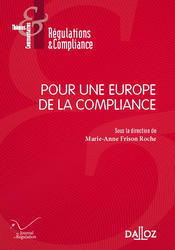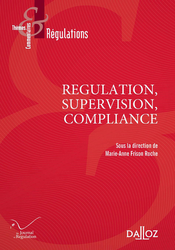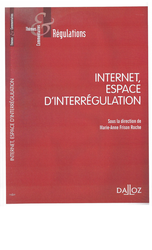May 29, 2019
Thesaurus : Doctrine

► Full Reference : K. Lenaerts, "Le juge de l'Union européenne dans une Europe de la Compliance" ("The Judge of the European Union in the Europe of the Compliance"), in M.-A. Frison-Roche (ed.), Pour une Europe de la Compliance, series "Régulations & Compliance", Dalloz, 2019, p.1-12.
____
📕read a general presentation of the book, Pour une Europe de la Compliance, in which this article is published
____
► Summary of the article (done by the Journal of Regulation & Compliance):
____
🦉This article is available in full text to those registered for Professor Marie-Anne Frison-Roche's courses
________
Oct. 4, 2017
Editorial responsibilities : Direction of the collection "Regulations & Compliance", JoRC & Dalloz

🌐follow Marie-Anne Frison-Roche on LinkedIn
🌐subscribe to the Newsletter MAFR Regulation, Compliance, Law
____
► Full Reference: M.-A. Frison-Roche (ed.), Régulation, Supervision, Compliance (Regulation, Supervision, Compliance), Dalloz, coll. "Thèmes & Commentaires", "Régulations" Serie, 2017, 148 p.
____
► General presentation of the book: Regulation. Supervision. Compliance. Three terms that until recently were virtually unknown in legal systems. Or at least considered to be peculiar to Anglo-American legal systems: Regulation, Supervision, Compliance. These terms are like Trojan horses through which Common Law is taking over our legal traditions to make European companies, especially banks, bend over backwards, take over institutions and impose methods.
Three words by which the invasion is carried out. Through the violence of repression and compliance penalties, through the mildness of codes of conduct and corporate social responsibility. By laws as new as they are strange, such as the French so-called "Sapin 2" law or the French law introducing a "duty of vigilance" for companies whose fault would be to have succeeded in expanding internationally.
One can have this defensive conception of Compliance, generating a "Compliance Law", produced by the internalisation of Regulatory Law in global economic operators, who are then subject to supervision by Regulators, even though these firms are not regulated, with Compliance extending beyond the supervised sectors (banks and insurance companies).
We can (and maybe must) have a more welcoming, and therefore more offensive, conception of Compliance. It can be the crucible of a relationship of trust on a supra-national scale between these operators and the regulators, the former being able to contribute, like the latter, to serving goals that go beyond them all, of which the fight against corruption and money laundering are but a few examples.
In this way, the issue is the construction of the European Compliance Law.
____
📝read the interview given by Marie-Anne Frison-Roche to the Petites Affiches, "We need to build a European compliance system - that's the future! ire l'entretien donné par Marie-Anne Frison-Roche aux Petites Affiches ,"Il faut construire un dispositif européen de compliance, voilà l'avenir !" ("We need to build a European Compliance System - that's the Future!"), about the publication of this book (in French)
____
____
This volume is the continuation of the books dedicated to Compliance in this collection.
📚Read the presentations of the other books on Compliance in this Serie:
- further books:
🕴️M.A. Frison-Roche (ed.), 📕Le système probatoire de la Compliance, 2025
🕴️M.A. Frison-Roche (ed.), 📕Compliance et Contrat, 2024
🕴️M.A. Frison-Roche (ed.), 📕L'obligation de Compliance, 2024
🕴️M.A. Frison-Roche et M. Boissavy (eds.), 📕Compliance et droits de la défense. Enquête interne - CJIP - CRPC, 2024
🕴️M.A. Frison-Roche (ed.), 📕La juridictionnalisation de la Compliance, 2023
🕴️M.A. Frison-Roche (ed.), 📕Les Buts Monumentaux de la Compliance, 2022
🕴️M.A. Frison-Roche (ed.), 📕Les outils de la Compliance, 2021
🕴️M.A. Frison-Roche (ed.), 📕Pour une Europe de la Compliance, 2019
🕴️N. Borga, 🕴️J.-Cl. Marin and 🕴️J-.Ch. Roda (eds.), 📕Compliance : l'Entreprise, le Régulateur et le Juge, 2018
- previous books:
🕴️M.A. Frison-Roche (ed.), 📕Internet, espace d'interrégulation, 2016
📚Read the presentations of the other titles of the Serie.
____
🏗️General construction of the book:
Consulter le sommaire de l'ouvrage.
____
► Understand the book through the Table of Contents and the summaries of each article:
🕴️M.-A. Frison-Roche, 📝Du droit de la régulation au droit de la compliance
I. AUTOUR DE LA NOTION DE COMPLIANCE (AROUND THE NOTION OF COMPLIANCE)
🕴️B. de Juvigny, 📝La compliance, bras armé de la régulation
🕴️I. Falque-Pierrotin, 📝L'Europe des données ou l'individu au coeur d'un système de compliance
🕴️B. Lasserre, 📝Concurrence et bien public
🕴️J.-M. Sauvé, 📝Compliance, droit public et juge administratif
🕴️J.-Cl. Marin, 📝Droit pénal et compliance
II. CHOCS ET ACCLIMATATION DE LA COMPLIANCE DANS LE SYSTÈME JURIDIQUE (SHOCKS AND ACCLIMATISATION OF COMPLIANCE IN THE LEGAL SYSTEM)
🕴️D. Migaud, 📝Le nouveau rapport entre l'État et les normes impliquées dans la compliance
🕴️A. C. Bénichou, 📝Nouvelles technologies : réflexions sur la compliance et l'éthique
🕴️J.-M. Darrois, 📝La loi Sapin II : un défi pour les avocats
🕴️Y. Perrier, 📝"Diplomatie" de la compliance et de sa régulation
III. LES DIALOGUES OUVERTS PAR LA COMPLIANCE (DIALOGUES OPENED UP BY COMPLIANCE)
🕴️J.-B. Auby, 📝Le dialogue de la norme étatique et de la compliance
🕴️L. Donnedieu De Vabres, 📝Pas de compliance sans confiance
🕴️J. Bédier, 📝La compliance, un outil actif de développement de l'entreprise
🕴️A. De La Cotardière, 📝Le rôle de l'avocat en matière de compliance
________
April 22, 2016
Editorial responsibilities : Direction of the collection "Regulations & Compliance", JoRC & Dalloz

Complete references : Frison-Roche, M.-A. (dir.), Internet, espace d'interrégulation, Serie "Régulations", coll. "Thèmes & Commentaires", Dalloz, Paris, 2016.
Read the presentation of the book (written in French).
Read the presentation of the authors of the contributions (written in French)
"Regulate the Internet".
Some argue that any regulation is contrary to the nature of digital. Others argue that this is indispensable, for its economic deployment and for public freedoms. Internet renews conceptions and practices. Notably those of the Law of the Regulation. Indeed, the Internet makes it possible to offer and obtain services that are in often regulated sectors: financial, audiovisual, healthcare, gaming. Moreover, they converge in new objects: the connected objects.
Often described as a "legal desert", digital appears as a kind of jumble of systems of various regulations that overlap, deform and contradict each other. In reaction, an "interregulation", de facto or de jure, in law more or less flexible, is in the process of being established. Who will be the Regulator: The States? The judge? The Internet users?
The future is open.
The book first determines the "Interregulation Needs" and then describes and conceives solutions for the interregulation of the digital space.
Read the presentation of the two articles written by Marie-Anne Frison-Roche:
Thinking the world from the notion of "data"
To draw the regulatory consequences of a rethinked world from the notion of "data"
The working papers which are the base of these articles are written in English.